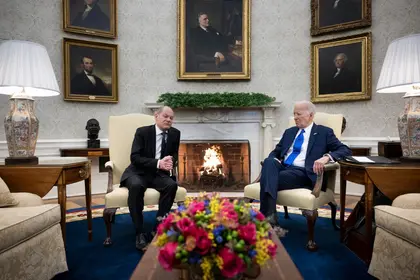German Chancellor Olaf Scholz and President Joe Biden urged US lawmakers Friday, Feb. 9, to approve a long-delayed military aid package for Ukraine, warning that Kyiv could not hold off Russia's invasion without it.
"The failure of the United States Congress in not supporting Ukraine is close to criminal neglect," Biden said as he hosted Scholz in the Oval Office.
JOIN US ON TELEGRAM
Follow our coverage of the war on the @Kyivpost_official.
"It is outrageous."
The German leader -- whose country is Kyiv's biggest military backer behind the United States -- said he hoped for progress in unblocking the multi-billion-dollar US assistance for Ukraine.
"Without the support of the United States and without the support of European states, Ukraine would have not a chance to defend its own country," Scholz warned.
He later told reporters after his meeting with Biden: "That is why we are both firmly convinced that this must happen now, but also confident that the American Congress will ultimately make such a decision."
Scholz also accused Russian President Vladimir Putin of "telling a lot of lies" in a "ridiculous interview" with US talk show host Tucker Carlson that was posted on Thursday.
"He wants to get a part of the territory of his neighbors. It's just imperialistic," Scholz said.
Biden did not answer when asked if he would also bring up with Scholz the issue of Wall Street Journal reporter Evan Gershkovich, who is imprisoned in Russia.
Putin hinted in the interview on Thursday that he was interested in a prisoner swap where the US reporter would be freed as part of a deal in which Germany would release a Russian convicted of assassinating a fugitive former Chechen rebel in Berlin.

Europe Should Be Afraid if Putin Accepts US-Proposed Peace Plan
- 'Security and peace' -
But it was Ukraine that dominated the day. The pro-Western country is entering its third year of war against the Russian invasion as the US Republican Party, led by presidential candidate Donald Trump, is increasingly turning its back.
The political paralysis in Washington has left Kyiv short of vital ammunition, just as Putin's forces make slow gains in a grinding winter offensive in eastern Ukraine.
The US Senate is debating a bill to renew the flow of weapons for Ukraine's battered army, but the bill -- if passed -- faces an even harder hurdle in the Republican-led House of Representatives.
Republicans are trying to tie the Ukraine aid to their demands for tougher action on the Mexican border, a key plank for Trump in November's US presidential election.
The Senate package would authorize $60 billion in military aid for Kyiv. In Europe, meanwhile, EU leaders last week finally overcame stalling by right-wing Hungarian leader Viktor Orban and gave the green light to 50 billion euros ($54 billion) in economic aid.
Scholz on Friday called the war in Ukraine the biggest crisis, "with all its consequences for security and peace not only in Europe but everywhere in the world."
The Scholz-Biden meeting also featured talks on escalating tensions in the Middle East, where Israel's war against Hamas shows no sign of letting up and Washington has launched strikes on Iran-linked targets following attacks on American troops.
Regional tensions rose after the death of three American soldiers in Jordan at the end of January, marking the first US military losses to hostile fire in the region since the Israel-Hamas war broke out on October 7.
Germany has backed Israel but also repeatedly warned of the dangers of a wider conflict while stepping up calls for more humanitarian aid to reach the war-ravaged Gaza Strip.
Biden sharpened his criticism of Israel in remarks late Thursday when he said the military operation in Gaza "has been over the top."
You can also highlight the text and press Ctrl + Enter






